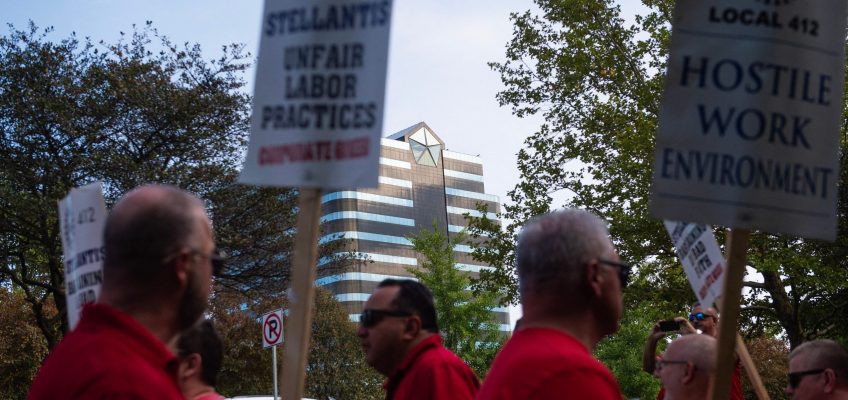The United Auto Workers announced it shut down Stellantis’ largest plant Monday morning, as thousands of Michigan workers walked out to join the ongoing strike against Detroit auto companies.
The expansion is a sign that the strike is becoming a slog, with the UAW continuing to reject the automakers’ offers — a scenario President Joe Biden is eager to avoid as his reelection effort gets under away amid an unpredictable economy.
The UAW said Chrysler parent Stellantis has fallen behind Ford and General Motors in appeasing the union at the bargaining table, leading to the walkout at the Sterling Heights Assembly Plant.
The new walkout brings the total number of striking workers to more than 40,000 and continues the UAW’s strategy of ramping up pressure on the automakers by keeping the companies guessing where the next work stoppage might be as they negotiate a new contract with the union.
UAW President Shawn Fain has been expanding the strike on a piecemeal basis since the it began Sept. 15.
The news comes nearly two weeks after the union’s last strike expansion, when thousands of UAW members unexpectedly walked out of a highly profitable Ford plant in Kentucky on Oct. 11. Monday’s strike expansion mirrors the one at Ford in that it targets a lucrative truck plant.
The walkout on the Stellantis plant, which is located in the politically crucial Macomb County and produces RAM 1500 trucks, comes days after Stellantis on Friday said talks with the union were “productive, building on the momentum from the past several weeks.”
With Fain repeatedly rejecting the automakers’ offers as inadequate, some executives have been speaking more publicly about their frustrations with the talks.
Last week, Ford Executive Chair Bill Ford called the negotiations “acrimonious.”
And on Thursday, the head of global manufacturing for GM said the company couldn’t meet all of the UAW’s demands without “devastating” it.
Nonetheless, GM came back to the union with some sweeteners on Friday: It said the majority of its workforce would make $40.39 per hour under the offer.
All three companies are currently proposing 23 percent wage increases.
The companies have also been warning about possibly broader economic consequences the longer the strike drags on.
All three have laid off workers during the strike, citing downstream effects of work stoppages at striking plants.
“If it continues, it will have a major impact on the American economy and devastate local communities,” Ford said. “The supply base is very fragile and will start collapsing with an expanded strike.”
But the union and its supporters have said any short-term damage would be more than made up for with a contract that provides good wages and benefits, which will help stoke local economies.


Leave a Reply